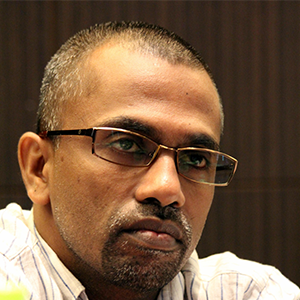Journalists—like rescue workers, military service members and health workers—frequently encounter trauma, Amantha Perera, the project lead at the Dart Centre Asia Pacific, told NPF’s International Trade Fellows in Singapore. [Transcript | Video]
“The difference between those professions and journalism is that … the idea of trauma impact and your mental health is recognized quite strongly [in the others], and also in an institutional manner, it’s been dealt with. But in terms of journalism, it has taken some time,” Perera said.
However, journalists’ awareness of trauma has accelerated rapidly in the past two years, according to his research.
During the lockdowns, “online usage by journalists for their work increased exponentially,” Perera said. “With the rise of using online resources more and more for their journalism, we saw the exposure to online threats also increasing.”
However, the obvious detriments to mental health that many journalists think of—threats of violence, verbal and sexual harassment—were ranked as having less impact than the information and misinformation the journalists consumed online.
“Before the lockdowns, about 9% of journalists said that information they consumed online was a threat to them. That number almost went up to about 50%,” he said. “They also said fake information, fake news was also another online threat.” Trolling, abuse and doxing were rated as less threatening than misinformation.
Why would this feel threatening now when journalists consumed troves of online information before without that result?
“The difference was that there was no break, that this was across the world, this was fatal, and this could impact all of us,” Perera said.
Conspiracy theories also took a toll on journalists’ sense of purpose, he said.
However, a positive development was that with the whole world talking about trauma and mental health, it “seeped into the journalism community,” Perera said, even in Asian newsrooms, which he notes have been slow to address mental health as a workplace issue.
The topic of trauma in journalism has gone from “you can’t be affected, you’re a journalist” to “we’ll get to it when we have time, when we have spoken about how financially stable our jobs are, how we can deal with breaking news, how we can deal with digitization, all that. Then we will get to trauma in journalism,” Perera said. “But now it’s core. It’s right, left, and center of the journalism conversation.”
Now that these conversations are taking place, journalists—especially managers—can take a more active, practical role in addressing trauma.
What is traumatic “depends who I am, the person I am, my personal circumstances, the life that I’ve lived so far, my job circumstances, everything. So it’s a very, very intimate experience,” Perera said. “Most of the time journalists don’t talk about this because it’s very personal, and they feel that talking about personal issues is an indication of vulnerability. So as journalists, as news managers, one of the key issues in managing mental health of yourself, and of others who are around you, is creating that atmosphere where we can have this conversation safely and in an environment where no one feels that they are being judged.”
When it comes to online trauma, Perera says the most important thing is boundaries. This can mean having different profiles and even separate personal and work devices to give yourself a break as well as make a distinction between what you do and who you are.
National Press Foundation’s International Trade Fellowship in Singapore is sponsored by the Hinrich Foundation. NPF is solely responsible for the content.







